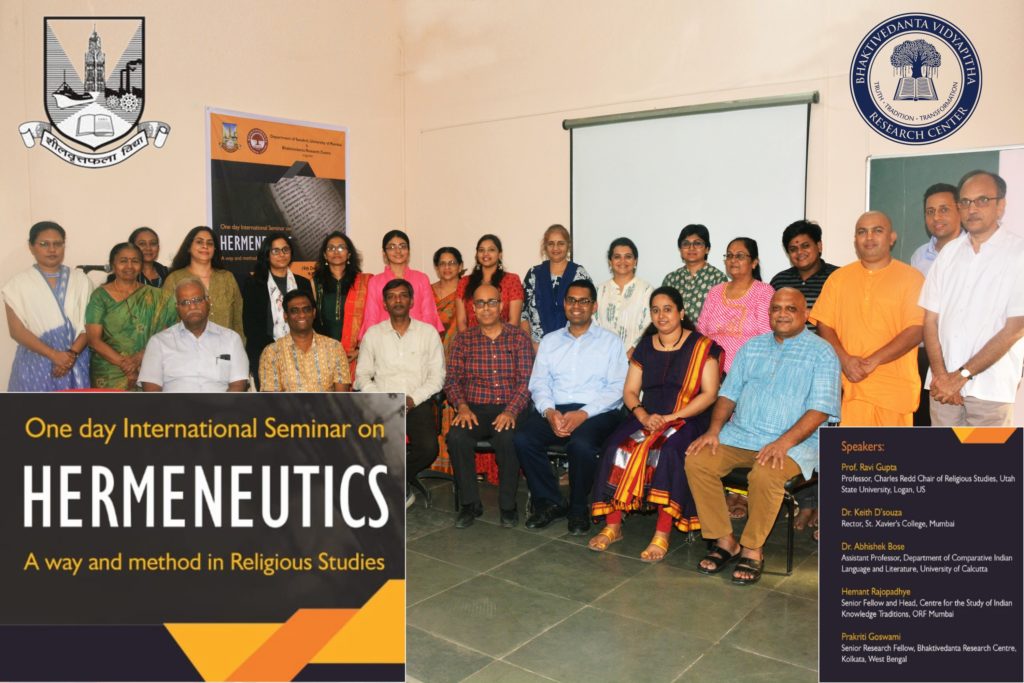
A seminar on ‘Hermeneutics – A way and method in Religious Studies’ was held on 19 December 2019, at Ramkrishna Bajaj Sanskrit Bhavan, at the Vidyanagari campus of Mumbai University. This was organaised by the Department of Sanskrit, Mumbai University in association with Bhaktivedanta Research Centre.
Prof. Ravi Gupta, Chief Guest as well as Chairperson of the seminar was introduced by Dr. Shakuntala Gawde, (Seminar Coordinator and Assistant Professor, Department of Sanskrit, University of Mumbai). The seminar was inaugurated by Prof. Ravi Gupta, Professor Charles Redd, Chair of Religous studies, Utah state University, Logan, US. After lighting of lamp and Sarasvati–vandana. Dr. Madhavi Narsalay, Assistant Professor, Department of Sanskrit, presented the preamble of the seminar. Dr. Sumanta Rudra (Academic Dean, Bhaktivedanta Research Centre) Welcomed all participant scholars.
Prof. Ravi Gupta, began his keynote address with a talk on the topic ‘What makes a good translation’. He explained in depth, what theology, religious study and hermeneutics are. By giving appropriate examples, he demonstrated the use of different hermeneutic principles in the interpretation of a certain passage. He discussed important guidelines of hermeneutics and the precautions that one needs to take while interpreting any text. He continued his explanation on the characteristics of a ‘Classic’ and opined that translating and interpreting classics is indeed a very difficult job. He told at length, the features of a good translation and the factors that affect it. He concluded that a teacher is a translator and hermeneute, as he translates an idea unknown to the students into their understanding.
Dr. Keith D’souza, Rector, St. Xavier’s College Mumbai, explained the nuances in respect of the principles of Biblical interpretation. He presented different principles of interpretations on the various sub-divisions of Christianity like Catholics, Protestants and so on. He discussed the criticisms which are needed to be studied while interpreting the Bible. The first half of the seminar concluded with Dr. D’Souza’s scholarly presentation. Thereafter, the speakers, delegates and participants had lunch break.
The post lunch session began with the speech of Dr. Abhishek Bose, Assistant Professor, Department of Indian Language and Literature, University of Calcutta. He spoke on the characteristics of Dharma and varied interpretations of a passage and stated that all interpretations are correct in their own way. Subsequently, he spoke about narratives, their structure and their distinctive features. This was followed by a talk by Prakriti Goswami, Senior Research fellow, Bhaktivedanta Research Centre, Kolkata, on the scriptural hermeneutics of Vallabha. She gave an idea of the epistemology as accepted by Vallabha and importance it confers on Bhagawata Purana and the theistic philosophy associated with it. She explained the means by which, Vallabha tried to synthesise the Vedic texts speaking of concrete Brahman and formless Brahman. She also shared her own experience of interpretation of Vallabha’s commentary on Bhagavata. The last speaker of the day was, Hemant Rajopadhye, Senior Fellow and Head, Centre for the Indian Knowledge Traditions, ORF, Mumbai. He discussed the rituals associated with Datta Sampradaya. According to him, ‘Sampradaya’ is interpreted as an unbroken lineage of spiritual gurus. While explaining the incarnations of Dattatreya, he also compared the modern Datta Sampradaya as against the traditional concepts. In support of his discussions, he showed a small video clip from a contemporary Marathi movie, wherein some ideas from Hindu religion have been interpreted on the basis of modern science.
The seminar gave a new insight into the theory of hermeneutics and translation studies. Expert and enlightening comments by Prof. Ravi Gupta on each talk enhanced the impact of that topic. All the speakers were felicitated by University authorities. Lastly, all the participants were awarded attendance certificates and the seminar concluded with a vote of thanks by Dr. Shakuntala Gawde
-Shruti Kanitkar
